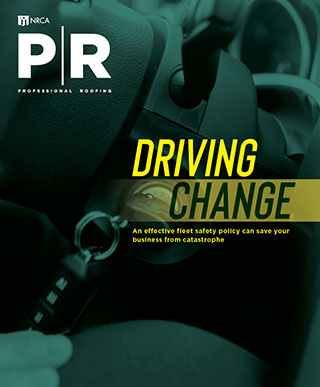If you are like most roofing contractors, insurance renewal time is one of your least favorite times of the year. Despite your best efforts to provide loss-control services to reduce claims, the cost of insurance continues to rise. You rely on your agent to get you the best rates, and yet you continue to hear the reason for rising rates is not the result of your claims history but a consequence of the roofing industry's high-risk nature.
Unfortunately, many roofing contractors do not have a fighting chance in the traditional insurance market regardless of having successful businesses. The property and casualty insurance industry's financial results for the first nine months of 2012 show better loss ratios combined with higher investment income for insurance carriers compared with 2011.
A year ago, many industry experts predicted a looming hard market (significant rising insurance rates), and, though this now looks unlikely, it still is anticipated insurance rates, specifically for workers' compensation, will rise. With a fluctuating market and increasing amount of claims being denied by carriers, it is easy to see insurance carriers hold the control.
Gain control
Fortune 500 executives have known for years alternative insurance programs exist, and captive insurance programs are one such alternative. Captive insurance is insurance provided by a company that is formed primarily to cover the assets and risks of its parent company or a group of companies. It is an alternative form of risk management that is becoming more practical and popular for companies—particularly those in high-risk industries such as roofing—that want to protect themselves financially while having more control over how they are insured.
Many large and midsized roofing contracting companies are choosing captive insurance programs to control their insurance destinies. If you consistently are top-of-class in the roofing industry in terms of size, financial stability and claims, a captive insurance program likely is right for you.
Group captive programs
Many types of captive insurance programs are available. Although Fortune 500 companies have the finances to act independently and take on more risk, "group captives" offer a more conservative approach by spreading the risk among several partners. A group captive insurance program allows you to join like-minded companies to increase control, build buying power and share risk among members. In short, members of a group captive insurance program own and control the program.
Group captive insurance programs can be held onshore or offshore. Depending on the captive insurance program's location, there will be different advantages based on the regulations of the state or country where the program is located. Although onshore captive insurance programs have become more common during the past few years, the most popular locations for group captive insurance programs continue to be places such as Bermuda and the Cayman Islands. These offshore locations have well-developed insurance infrastructures along with an absence of local income tax or other taxes.
Benefits
Benefits of group captive insurance programs include long-term control, upfront savings and the potential for significant returns in addition to investment income.
The ability to improve the claims-management equation also appeals to many companies. Every company has dealt with a claim it believed was fraudulent, and, oftentimes, despite a company's suspicions, the insurance carrier will settle and pay for claims for reasons benefitting the carrier. In addition, the company the claim was brought against may not be notified the claim was settled for a high-dollar amount. In a group captive insurance environment, this issue is much less common because companies are informed of any claims posted to their programs. In a group captive insurance environment, a company also can fight claims it believes are fraudulent and/or settle claims with which it agrees.
Additionally, all loss funds (premium dollars) not used to pay claims result in returned premiums in addition to investment income. With the ability to see significant returns of their insurance premium dollars, business owners typically become creative when deciding where the money will go.
Whatever the strategy, it is recommended you consult with your accountant or tax adviser regarding the best strategies.
What's right for you?
Captive insurance programs can benefit many organizations, but they are not for everyone. Companies that have below-average loss-control strategies and experience a large number of claims will not be accepted; they also would experience too much risk to enjoy the benefits.
The traditional insurance market has its disadvantages; however, it also offers less risk than a captive insurance program and allows the consumer to adjust premium costs by increasing or decreasing deductibles or coverages. These strategies along with building a strong relationship with insurance carriers will be key when market pricing starts to increase.
The big question is finding out whether a captive insurance program is right for your organization. Chances are, if your current agent has not told you about a captive insurance program, the agent does not have the capability to provide one or does not have adequate knowledge regarding captive insurance programs. If this is the case, find an agent who has the knowledge. You can do this by contacting a few insurance providers in your area to see whether they offer captive insurance programs.
Your broker or adviser should conduct a feasibility study to determine whether you are a good captive insurance program prospect or whether you need to implement strategies to improve controls that will allow you to enjoy the benefits of these programs in the future. Loss control becomes more important than ever as these services, which historically have benefitted insurance companies, now become a unique opportunity for you to build better loss-experience results and higher profits.
A captive insurance program provides a unique opportunity for business owners to save tax dollars and put more money in their bank accounts.
As you research this topic, you may become overwhelmed by the amount of different programs that are available and underwhelmed by the amount of information regarding their differences. It is not difficult information to process as long as you align yourself with an experienced captive insurance adviser and an accountant with captive insurance program knowledge. More information about captive insurance programs also is available on Kansas City, Mo.-based The Miller Group's website, www.insurancecaptives.com.
Reap the rewards
With a changing economic landscape and more regulations being placed on the insurance market, it is important for you to be aware of alternative insurance options. Instead of dealing with brokers who think insurance is a commodity, think about insurance captives as a way for you to take control of your insurance and, in turn, reap the financial rewards.
Nate Heying is vice president of The Miller Group's Captive Division, Kansas City, Mo.
Did you know?
NRCA has numerous publications, programs and resources to help members with insurance issues. For more information, contact Tom Shanahan, NRCA's associate executive director of risk management, at tshanahan@nrca.net.



